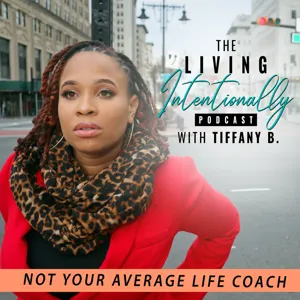Podcast Summary
Overcoming the Fear of Abandonment: Building Trust and Meaningful Connections: It is normal to fear abandonment, but it is essential to come to terms with the fact that not every relationship will last. By treating ourselves with kindness and seeking healthier relationship patterns, we can overcome this fear and form meaningful connections.
A fear of abandonment can significantly impact our ability to form meaningful connections and trust others. It is a deep belief system and anxiety that can disrupt our relationships in subtle and invisible ways. While it is natural to want to avoid emotionally painful experiences like rejection or heartbreak, it is important to come to terms with the fact that not every relationship will last. We cannot control how our relationships unfold, but we can control how we treat ourselves and respond to these unfortunate events. For some of us, this fear of abandonment prevents us from getting close to others, leading to emotional numbness and avoidance. On the other hand, it can also manifest as intense people-pleasing tendencies and clinginess. However, it is important to remember that there are people who will stay in our lives for years, and we should not let this fear dictate our actions and relationships. Our past experiences and trauma may influence how we navigate relationships in our twenties, but it is essential to recognize that these emotional reactions are not our fault and seek healthier relationship patterns.
Understanding and managing a fear of abandonment: A fear of abandonment is a common anxiety linked to emotional unavailability and hyper independence. It can negatively impact relationships, but understanding its origins and learning how to manage it can foster healthier connections.
A fear of abandonment is an overwhelming and unwarranted anxiety that many of us experience. It is not a recognized mental health condition, but rather a type of anxiety closely linked to other concepts such as emotional unavailability and hyper independence. The primary function of this fear is to avoid the pain of rejection, dismissal, or being let down. It affects not only romantic relationships, but also friendships, family dynamics, and even professional connections. It stems from a deep fear of losing the things and people we value, and often leads to irrational behaviors like sabotaging relationships or clinging too tightly. Understanding the origins of this fear and learning how to manage it can help in building healthier and more trusting connections with others.
Understanding and Overcoming the Fear of Abandonment in Romantic Relationships: The fear of abandonment in romantic relationships is common and can stem from unconscious influences, but understanding these tendencies can help us heal and build healthier connections.
Many individuals have fears of being abandoned, especially in the context of romantic relationships. Romantic relationships involve a higher level of emotional closeness, intimacy, and vulnerability, making the risk of being hurt much greater. Our natural instinct to avoid pain extends to emotional pain, as psychological distress can manifest as physical discomfort. It is important to note that experiencing a fear of abandonment is not intentional or voluntary; it often stems from unconscious influences and can interfere with our ability to form connections. Different individuals may exhibit various patterns of behavior related to abandonment fears, such as sabotaging relationships, clinging to others, or seeking security through early milestones. Understanding these tendencies can help us examine our own emotional wounds.
Understanding and Coping with the Fear of Abandonment: Recognizing and addressing the behaviors associated with fear of abandonment is crucial for personal growth and the development of healthier, more fulfilling relationships.
Individuals with a fear of abandonment may exhibit different behaviors to cope with their fear, such as avoidance, cycling through relationships, sabotage, and emotional baiting. It's important to understand that these individuals are not bad people and should not be ashamed of their actions. Recognizing and acknowledging these behaviors is crucial for personal growth and developing healthier relationships. By understanding the root causes of their fear and addressing maladaptive behaviors, individuals can work towards building trust, intimacy, and lasting connections. It's also important to remember that these behaviors are not deliberate attempts to sabotage relationships, but rather a way of protecting oneself and seeking love and reassurance.
Overcoming the Fear of Abandonment for Healthy Relationships: Recognizing and addressing the fear of abandonment is crucial for building healthy relationships, as it can lead to counterproductive behaviors and hinder the development of trust and intimacy.
Individuals who have a fear of abandonment may exhibit behaviors that are counterproductive to building healthy relationships. They may test their partners to ensure genuineness and commitment, while also clinging to unhealthy relationships due to a fear of being alone. Constant reassurance becomes necessary in order to ease their anxieties and maintain a sense of security. However, these behaviors can be harmful as they may lead to neglecting one's own needs and hypersensitivity to conflict. It is important to recognize that these behaviors are not romantic or desirable, despite their portrayal in popular culture. Understanding the impact of fear of abandonment can help individuals navigate relationships more effectively and work towards building trust and intimacy.
The Impact of Childhood Experiences on Adult Relationships.: Childhood experiences play a significant role in shaping our fears of abandonment and attachment styles in adult relationships, highlighting the importance of understanding these factors for forming healthier connections.
Our fear of abandonment and dysfunctional attachment styles in relationships can stem from childhood experiences and beliefs. When we have experienced heartbreak or betrayal, we might try to appear emotionless and detached as a defense mechanism against further pain. This fear of abandonment is often rooted in experiences where basic comforts like affection and emotional connection were denied during childhood. Traumatic events or disruptions in our early relationships can also impact our ability to trust and maintain relationships as adults. It is crucial for psychology to investigate the influence of early romantic experiences on our later emotional well-being and how they shape our understanding of love. Understanding these factors can help us form healthier relationships and seek out the right people.
Understanding Abandonment Issues and Borderline Personality Disorder (BPD): Overcoming the fear of abandonment involves breaking self-sabotaging patterns, learning to trust and love others, and recognizing the invisible struggles and insecurities that come with the fear of not being loved or valued.
Abandonment issues can stem from painful past experiences, particularly in relationships, and can be closely linked to borderline personality disorder (BPD). While not everyone with abandonment issues has BPD, the fear of abandonment is a common symptom in those affected by BPD. This fear often leads to unhealthy attachments, erratic behavior, and difficulty maintaining stable relationships. Overcoming the fear of abandonment requires breaking self-sabotaging patterns and avoidant behaviors, as well as learning to trust and love others. It is important to recognize and address these invisible struggles and insecurities, acknowledging the vulnerability that comes with the belief that we may not be loved or valued enough to avoid abandonment.
Overcoming the Fear of Abandonment: Our fear of abandonment does not define our worth. Understanding and addressing the root causes of this fear can help us build healthier and more fulfilling relationships.
A fear of abandonment does not define our worth as individuals. It is natural to have concerns about being rejected or left behind, especially if we have experienced hurtful events in the past. However, it is important to recognize that these fears are often subconscious and do not reflect our true qualities or the depth of our souls. Our behaviors and defense mechanisms to protect ourselves from abandonment may actually push others away, creating a self-fulfilling prophecy. To break this cycle, we need to acknowledge and address the root causes of our fear, so that we can have healthier and more fulfilling relationships. Understanding that our anxieties may not always be rational or objective is crucial in overcoming this fear.
Overcoming Fear of Abandonment for Healthy Connections: To maintain healthy connections, it is important to objectively examine and understand our fears of abandonment, communicate openly, and seek reassurance rather than testing or pushing our partner away.
In order to prevent our fear of abandonment from interrupting healthy connections, we need to acknowledge and examine our own fears objectively. It is important to understand where these fears originated and how they continue to influence our current experiences. It is crucial to realize that these fears are not our fault and do not define us. By identifying the triggers that elicit intense emotional responses, such as a partner not replying to messages or asking for alone time, we can pause, assess the situation, and seek reassurance through vulnerability and open communication. Testing our partner through emotional baiting or pushing them away will not provide clarity, but honest and open communication will.
The importance of open communication and self-care in relationships: Communicate openly with your partner, prioritize self-care, and challenge negative beliefs to maintain a healthy and secure relationship. Take chances in life, even if it means experiencing some hurt.
Open communication is crucial in addressing anxiety and fears in a relationship. It is important to express your feelings to your partner and discuss any concerns openly. Recognize that the reasons they may have for not checking in during the day are likely valid and not what you may be assuming. Additionally, it is important to avoid self-abandonment and prioritize your own physical, mental, emotional, social, and spiritual needs. Don't neglect your friends, hobbies, self-care practices, or personal well-being in an effort to maintain the relationship. By maintaining the life that you love, you have less time to worry unnecessarily and can feel more secure in your connections with others. Remember that your feelings are not always reflective of reality and challenge negative beliefs by questioning the evidence. Ultimately, it's better to take chances and let life surprise you, even if it means experiencing some hurt along the way.
The Power of Effective Communication in Building Strong and Healthy Relationships: By over-communicating our needs and feelings, gradually opening up about past trauma, and seeking support through therapy, we can overcome anxiety and cognitive biases, fostering understanding and creating stronger connections.
Effective communication is crucial in maintaining healthy relationships. Over-communicating your needs, feelings, and interpretations of situations can help overcome cognitive biases and anxiety that may disrupt relationships. While it's important to avoid oversharing too early on, opening up gradually about past trauma and explaining your reactions and need for reassurance can foster understanding and create a sense of security. Additionally, therapy can be highly beneficial in addressing underlying issues and negative beliefs. It's reassuring to know that there are people out there who will meet you in the middle and provide consistent love and companionship. This conversation serves as a comforting reminder and a valuable resource for those experiencing anxiety or worries in relationships. Effective communication and seeking support can lead to stronger, healthier connections.






